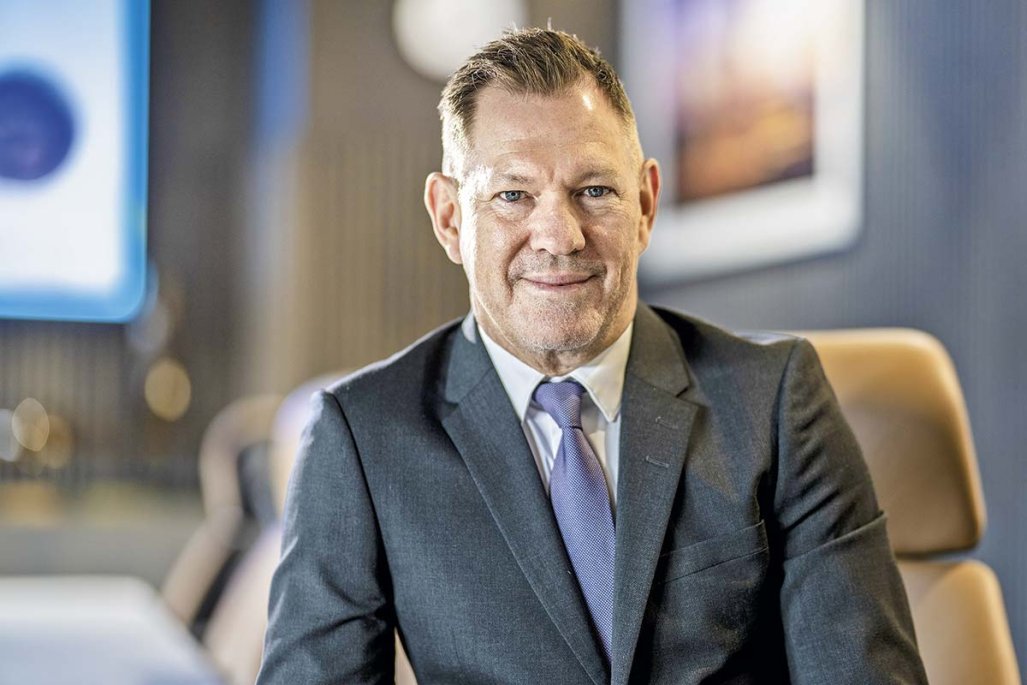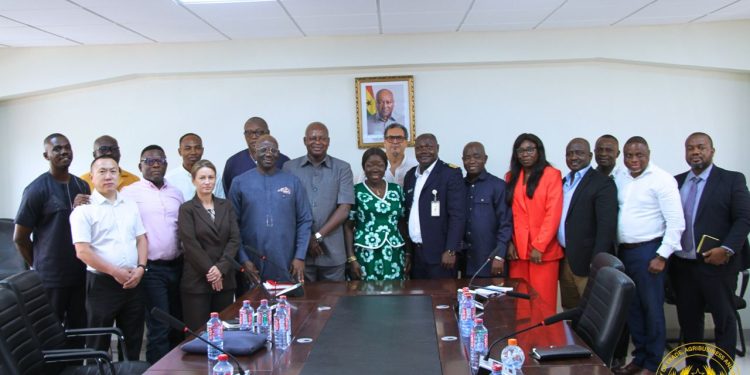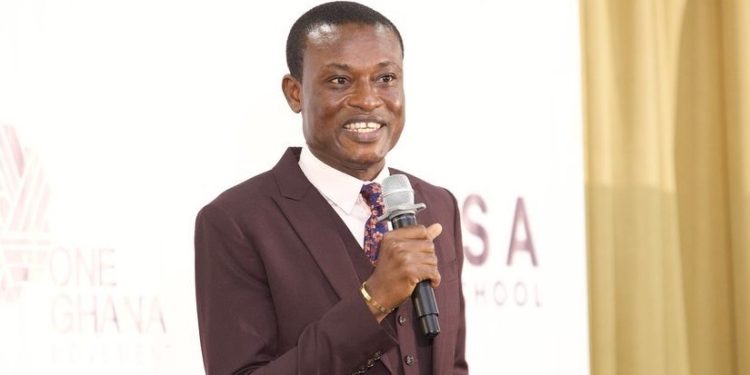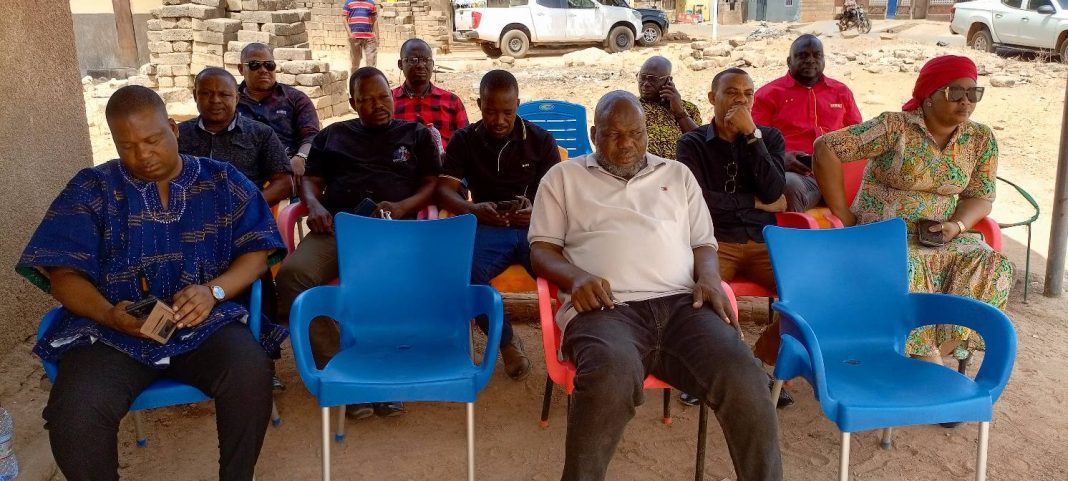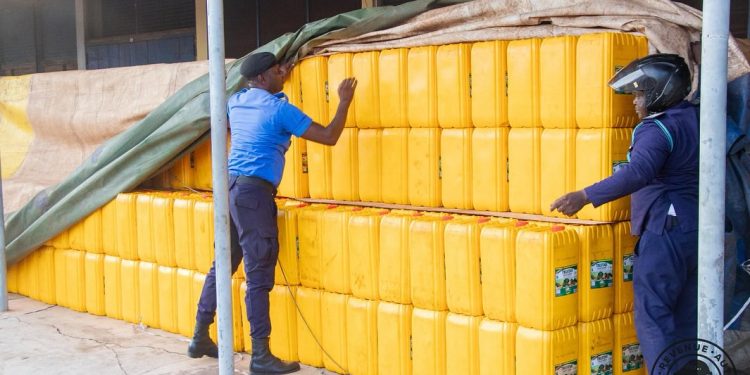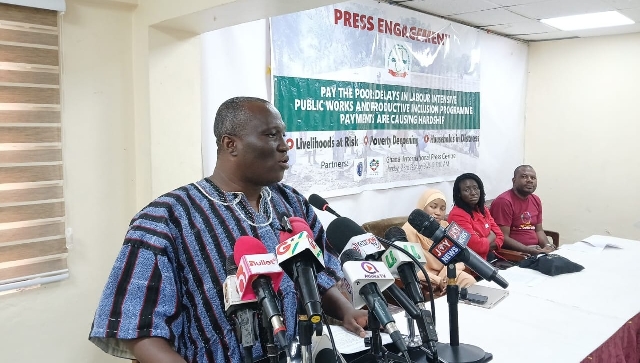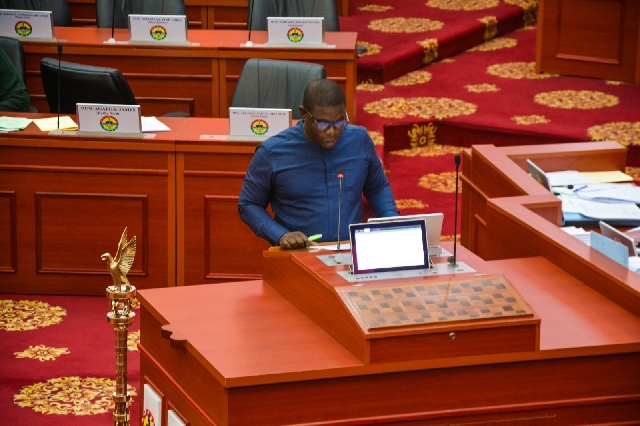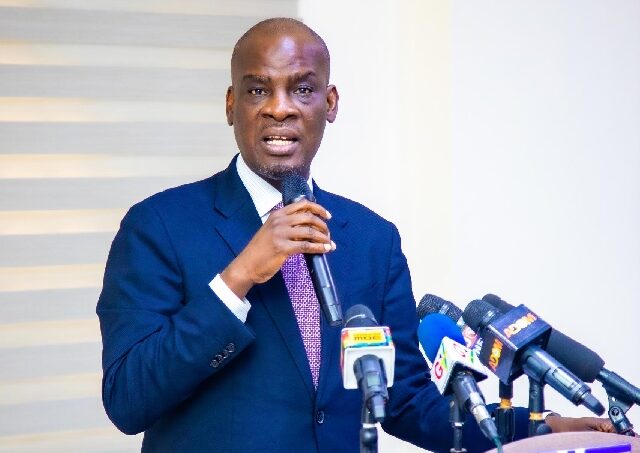Sustainable WASH Services: A Cornerstone for Socio-Economic Development in Ghana
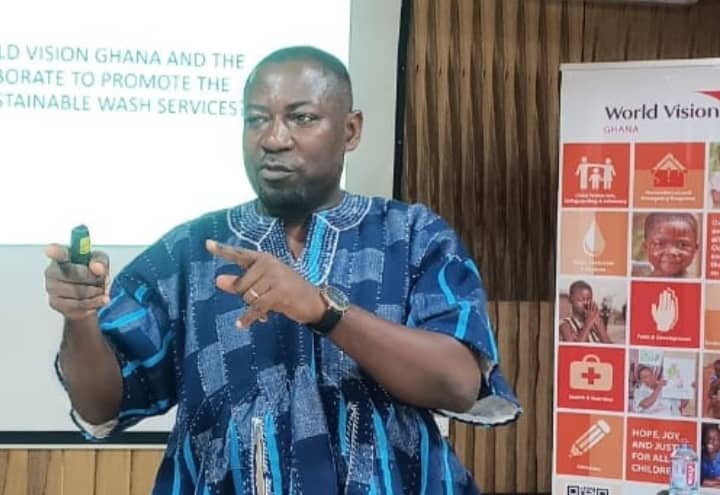
Access to sustainable water, sanitation, and hygiene (WASH) services is a fundamental human right, essential for human well-being, dignity, and economic productivity. Apexnewsgh reports In Ghana, World Vision Ghana, a humanitarian organization dedicated to improving the lives of children, families, and communities, has emphasized the crucial role of sustainable WASH services in achieving socio-economic development. During a joint workshop with the Ghana WASH Journalists Network (GWJN) and the Media Coalition Against Open Defecation (M-CODe), Mr. Yaw Attah Arhin, a WASH Specialist with World Vision Ghana, highlighted the importance of sustainable WASH services and the need for collaboration to achieve this goal. The Role of Sustainable WASH Services in Socio-Economic Development Arhin stressed that access to sustainable WASH services is a fundamental catalyst for growth and a core value of World Vision Ghana. Sustainable WASH services are critical for preventing the spread of diseases, reducing child mortality rates, and improving public health. However, he acknowledged that access to clean water, sanitation facilities, and good hygiene practices is essential for economic productivity, education, and gender equality, emphasizing that sustainable WASH services are a prerequisite for achieving the United Nations’ Sustainable Development Goals (SDGs), particularly SDG 6, which aims to ensure universal and equitable access to safe and affordable drinking water and sanitation for all. The Power of Media in Advocating for Improved WASH Services World Vision Ghana recognizes the media’s potential to drive change and transformation in society, making them valuable partners in advocating for improved WASH services. The workshop aimed to enhance the skills of journalists in the Ghana WASH Journalists Network and the Media Coalition Against Open Defecation, enabling them to effectively advocate for better WASH services and report on related issues. “By sharpening their skills and knowledge on international best practices and global developments, journalists can support World Vision Ghana’s policy engagements and influence policy changes for accelerated delivery of WASH services”. Collaboration for Progress Mr. Arhin emphasized the importance of collaboration in achieving the goal of improved WASH services. World Vision Ghana acknowledges the media’s capacity to amplify the message and drive progress in the WASH sector. The organization is committed to working with the media, government, and other stakeholders to ensure that sustainable WASH services are accessible to all Ghanaians, particularly the most vulnerable populations. By working together, we can ensure that Ghana achieves the SDGs and becomes a more prosperous and equitable society. Conclusion Mr. Arhin believes, sustainable WASH services are essential for socio-economic development in Ghana, as he further emphasized on the importance of sustainable WASH services and collaboration with the media and other stakeholders is crucial in driving progress in the WASH sector. By working together, we can ensure that all Ghanaians have access to clean water, sanitation facilities, and good hygiene practices, leading to improved public health, economic productivity, and a better future for generations to come. Source: Apexnewsgh.com Thanks for reading from Apexnewsgh as a news publishing website from Ghana. We encourage you to freely share this story via social media platform and follow us on; Facebook on APEXNEWSGH-Tv or Please contact Apexnewsgh.com on email apexnewsgh@gmail.com for your credible news publications. Contact: 0248250270/0256336062.
Environmental Communication Expert Urges Media to Champion WASH Awareness
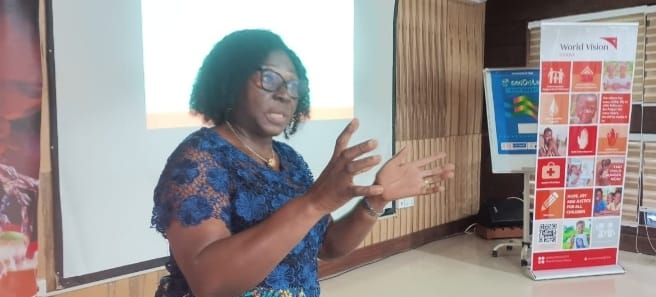
Madam Ama-Kudom Agyemang, Executive Director of Media Platform on Environment and Climate Change (MPEC), has emphasized the media’s vital role in promoting Water, Sanitation, and Hygiene (WASH) in Ghana. Apexnewsgh reports The well known environmental communicator made her emphasis during a joint workshop for the Ghana WASH Journalists Network (GWJN), Media Coalition Against Open Defecation (M-CODe), and journalists at Ada Aqua Safari Resort. Madam Agyemang, led a session on “Strategies for Effective WASH Journalism and Advocacy,” highlighting the media’s power to raise awareness and change attitudes and behaviors. According to her, the media can make a difference by educating the public about the risks of poor WASH practices and how to prevent them, “the media can make a significant impact on the lives of all Ghanaians”. She stressed Auntie Ama, as she is widely known further encouraged journalists to utilize various media outlets to reach a wider audience and promote WASH awareness, emphasizing the importance of collaboration between the media, civil society, and government to drive meaningful change in the WASH sector. “By working together, we can ensure that all Ghanaians have access to safe water, sanitation, and hygiene facilities, ultimately improving public health and well-being”. Source: Apexnewsgh.com Thanks for reading from Apexnewsgh as a news publishing website from Ghana. We encourage you to freely share this story via social media platform and follow us on; Facebook on APEXNEWSGH-Tv or Please contact Apexnewsgh.com on email apexnewsgh@gmail.com for your credible news publications. Contact: 0248250270/0256336062.
World Vision Ghana Urges Government to Establish National Sanitation Authority
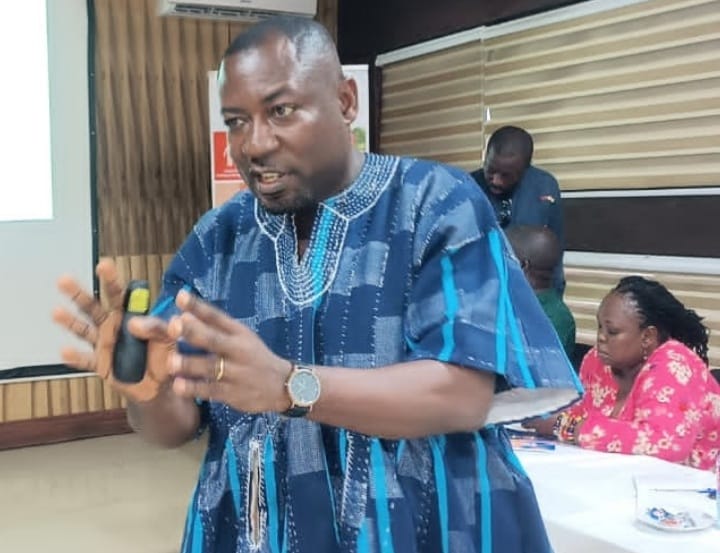
World Vision Ghana, a leading humanitarian organization, has called on the government to establish a National Sanitation Authority to address the country’s sanitation challenges. Apexnewsgh reports Mr. Yaw Attah Arhin, a Water, Sanitation, and Hygiene (WASH) specialist with World Vision Ghana, made this appeal during a joint workshop with the Ghana WASH Journalists Network (GWJN), the Media Coalition Against Open Defecation (M-CODe), and journalists from across the country. The Need for a National Sanitation Authority Mr. Arhin emphasized the need for a National Sanitation Authority, a proposal that has been pending since 2017 despite numerous meetings and discussions. He stressed that the lack of a National Sanitation Authority has hindered effective management of the sanitation sector, resulting in inadequate sanitation services for many Ghanaians. Benefits of a National Sanitation Authority Mr. Arhin highlighted the numerous benefits that a National Sanitation Authority would bring to the country’s sanitation sector. These benefits according to Mr. Arhin include: Standardization: Ensuring consistency in sanitation practices and standards across the country. Compliance: Enforcing regulations and guidelines to improve sanitation services. Enforcement: Strengthening enforcement mechanisms to address sanitation-related issues. Research and Development: Promoting innovation and research in the sanitation sector. The Current State of Sanitation in Ghana Mr. Arhin lamented that Ghana is losing out by not having a National Sanitation Authority, as the sanitation sub-sector is struggling, with only a few private sector players making a positive impact. He emphasized that the establishment of a National Sanitation Authority is long overdue and essential to address the sanitation challenges facing the country. A Call to Action Mr. Arhin urged the government to expedite the process of establishing the National Sanitation Authority and the National Sanitation Fund. He emphasized that this is critical to ensuring effective management of the sanitation sector, leading to improved sanitation services and a healthier environment for Ghanaians. Conclusion World Vision Ghana’s appeal for a National Sanitation Authority resonates with the need for improved sanitation services in Ghana. Mr. Arhin believes that establishing such an authority would standardize practices, ensure compliance, and promote research and development in the sanitation sector. “The government must take action to address the country’s sanitation challenges and ensure a cleaner, healthier environment for its citizens. By establishing a National Sanitation Authority, Ghana can take a critical step towards achieving the Sustainable Development Goals (SDGs), particularly Goal 6, which focuses on ensuring access to safe and dignified sanitation services for all”. Source: Apexnewsgh.com Thanks for reading from Apexnewsgh as a news publishing website from Ghana. We encourage you to freely share this story via social media platform and follow us on; Facebook on APEXNEWSGH-Tv or Please contact Apexnewsgh.com on email apexnewsgh@gmail.com for your credible news publications. Contact: 0248250270/0256336062.
Menstrual Health in Ghana: The Need for a Comprehensive National Policy

A recent joint workshop organized for WASH journalists across Ghana has shed light on the state of menstrual health in the country. Apexnewsgh reports According to Water Aid statistics, 75% of girls in Ghana learn about menstruation before their first period, but a significant 40% feel uncomfortable discussing it with their mothers. This highlights the need for improved menstrual education and open dialogue within families and communities. Executive Director of InspireHer Ghana, Madam Sandra Boakye, has made a passionate appeal to the government, particularly policymakers, to establish a national menstrual policy. She emphasized the severe impact of “menstrual poverty” on the welfare and development of young girls and women. Madam Boakye stressed that while there are guidelines for menstrual health, a comprehensive policy is lacking. She explained that a national policy would encompass how education should be done, including inclusive education for persons with disabilities and those in isolated areas. Additionally, it would cover the production, importation, distribution, and pricing of menstrual products. The workshop, organized by World Vision in partnership with the Ghana Water Journalists Network (GWJN) and the Media Coalition on Open Defecation (M-CoDE), aimed to raise awareness about menstrual health and hygiene. Madam Boakye’s appeal resonated with the participants, emphasizing the need for a comprehensive policy to address the challenges surrounding menstruation in Ghana. The statistics presented at the workshop highlight the need for improved menstrual education and open dialogue. While 75% of girls learn about menstruation before their first period, 40% feel uncomfortable discussing it with their mothers. This indicates a significant gap in menstrual education and the need for a more comprehensive approach. Madam Boakye’s appeal to the government is timely, as menstruation is an integral part of development that affects individuals in various ways. The lack of a comprehensive policy hinders efforts to address menstrual poverty, which has far-reaching consequences on the welfare and development of young girls and women. However, the workshop pointed the need for improved menstrual education and open dialogue, and Madam Boakye’s appeal for a comprehensive national policy is a step in the right direction. It is essential for the government to take heed of this call and work towards establishing a policy that addresses the challenges surrounding menstruation in Ghana. Source: Apexnewsgh.com Thanks for reading from Apexnewsgh as a news publishing website from Ghana. We encourage you to freely share this story via social media platform and follow us on; Facebook on APEXNEWSGH-Tv or Please contact Apexnewsgh.com on email apexnewsgh@gmail.com for your credible news publications. Contact: 0248250270/0256336062.
WASH: M-CODe Reaffirms Commitment to Improving WASH Services in Ghana

The Media Coalition Against Open Defecation (M-CODe) has reaffirmed its dedication to promoting access to safe water, sanitation, and hygiene (WASH) services in Ghana, with a special focus on the northern regions. Apexnewsgh reports Speaking at forum organized in partnership with World Vision Ghana in Ada Aqua Safari Resort on Thursday, the M-CODe National Convenor Mr. Francis Ameyibor, pledged to intensify efforts in addressing WASH challenges, promoting menstrual hygiene management, and advancing effective journalism and advocacy in the sector. Mr. Ameyibor expressed its gratitude for World Vision Ghana’s efforts in improving lives and looks forward to a collaborative partnership towards achieving “life in all its fullness.” The coalition vowed to utilize their platforms to amplify marginalized voices, share success stories, and inspire action towards creating a Ghana where everyone has access to safe WASH services. This commitment is a significant step towards achieving the “REPOSITIONING WASH AS A KEY DRIVER OF NATIONAL DEVELOPMENT” agenda, and stakeholders are optimistic about the potential impact on the lives of Ghanaians. Ghana faces significant Water, Sanitation, and Hygiene (WASH) challenges, with a substantial portion of the population resorting to open defecation and sharing latrines. According to statistics, 17.7% of the country’s population, equivalent to over 4.5 million people, practice open defecation, posing serious health risks. Additionally, 55% of the population, approximately 13.7 million people, share latrines, which can lead to the spread of diseases. These data above show the need for intensified efforts to improve access to safe WASH facilities, particularly in rural and underserved areas. M-CODe’s renewed commitment is a testament to the power of collaboration and advocacy in driving progress in the WASH sector. By intensifying efforts and working together, M-CODe and its partners health, dignity, and well-being for all. The National Convenor also used the medium to send his gratitude to World Vision Ghana for the wonderful partnership so far. Source: Apexnewsgh.com Thanks for reading from Apexnewsgh as a news publishing website from Ghana. We encourage you to freely share this story via social media platform and follow us on; Facebook on APEXNEWSGH-Tv or Please contact Apexnewsgh.com on email apexnewsgh@gmail.com for your credible news publications. Contact: 0248250270/0256336062.
WASH: Journalists Urged to Support Women’s Menstrual Hygiene Amidst WASH Challenges
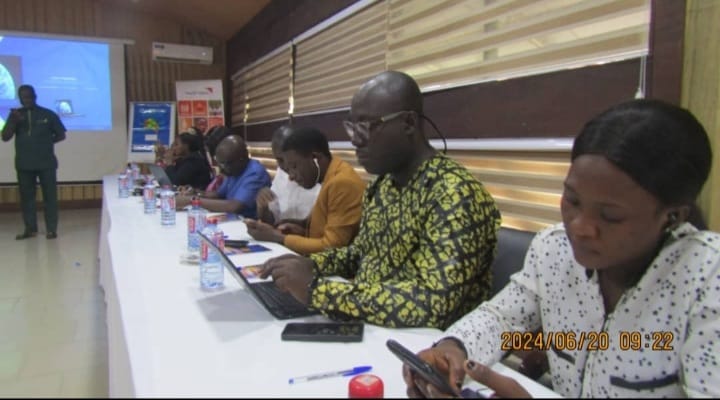
In a joint workshop with M-CODe, Justice Lee Adoboe, National Coordinator for the Ghana WASH Journalists Network (GWJN), tasked journalists to advocate for women’s menstrual hygiene, emphasizing that everyone is a product of the menstrual cycle. Apexnewsgh reports Addressing Journalists from various regions of the country on Thursday in Ada at AQUA Safari Resort, Mr. Adoboe stressed the importance of constant skill development and partnerships, using GWJN- M-CODe partnership with World Vision Ghana as example, to achieve universal access to improved sanitation and contribute to SDG-6 targets. GWJN National Coordinator further noted, that Menstrual hygiene advocacy is crucial, as poor hygiene poses serious health risks, including infections and infertility. Mr. Adoboe urged journalists to play a critical role in advocating for improved sanitation facilities, education, and support for women and girls. “As our partners repose so much trust in us, we must work hard to justify that trust by constantly playing our media advocacy role, information role, and if the needs be, apply the critical voice to issues in the WASH sector, all in the interest of getting duty bearers off their bums and taking the right and relevant actions that make the collective national WASH goals achievable” he stressed He further emphasized that everyone benefits from the menstrual cycle and must work together to support women. Source: Apexnewsgh.com Thanks for reading from Apexnewsgh as a news publishing website from Ghana. We encourage you to freely share this story via social media platform and follow us on; Facebook on APEXNEWSGH-Tv or Please contact Apexnewsgh.com on email apexnewsgh@gmail.com for your credible news publications. Contact: 0248250270/0256336062.
Poor access to toilets in schools objectionable – CONIWAS Chairman

Mr Yaw Attah Arhin, Chairman Coalition of NGOs in Water and Sanitation (CONIWAS) has stated that poor access to toilets in households, schools, healthcare facilities, and other public places is nerve-wracking, “We find it objectionable”. Mr Arhin, CONIWAS Chairman stated at the opening ceremony of the 33rd edition of the Mole Conference Series at Elimina in the Central Region, that the inequalities are much more pronounced. He said it is interesting that all five regions of Northern Ghana have open defecation rates higher than 50 percent with Savannah and Upper East Regions recording open defecation rates of 68.5 percent and 68.4 percent respectively. He noted that it is unacceptable that in the 21st Century, 74.7 percent of households in Ghana lack access to improved toilet facilities that are not shared, stressing that “it is equally worrying that 17.7 percent of Ghana’s population still practice open defecation”. The CONIWAS Chairman, however, applauded the government in the area of solid waste management, as it has rolled-out strategies and effectively partnering the private sector to progressively realize the president’s vision of a clean, healthy, and prosperous Ghana. Mr Arhin said the completion of solid and liquid waste treatment facilities in Accra and Kumasi and the ongoing waste treatment facilities in all the regional capitals bears ample testimony to what partnership with the Private Sector can achieve. “I wish to single out Dr. Joseph Siaw Agyepong for special praise. His commitment and passion for waste management and environmental sanitation in Ghana has brought a great deal of relief to citizens,” the CONIWAS Chairman stated. Mr Arhin also recounted the introduction of the Ghana WASH Week to trigger an unquenchable national consciousness and greater prioritization towards improving the country’s water, sanitation and hygiene situation. “I am happy to report that, in collaboration with the Ministry of Sanitation and Water Resources, and with support from UNICEF and the GAMA Sanitation and Water project, the maiden edition of the Ghana WASH Week was successfully launched with activities such as breakfast conversations, a walk for the clean Ghana Agenda, Town Hall Meetings and media engagements implemented in Accra, Kumasi the Tamale. “One remarkable achievement of the Walk in Kumasi was that it reunited Lil Wayne and Dr Likee who both joined us with their teams to walk for the Clean Ghana Agenda. “We look forward to working with all of you to implement the 2nd edition of the week in 2023. Consultations have begun in earnest and we should be able to announce a date before conference ends. This will enable all of us to block the date and prepare adequately towards it”. the theme for the Mole XXXIII WASH Conference Ghana’s Commitment to Water, Sanitation and Hygiene (WASH): Connecting Systems to Bridge the Service Delivery Gaps has been carefully selected to reflect the complex mix of interventions and the systems required to deliver sustainable WASH services to the good people of Ghana, particularly the poor and vulnerable. A five-member team of the Media Coalition Against Open Defecation (M-CODe) led by Ms. Winifred Afum, National Vice Convener who is also a journalist with the Ghana Television, and Ms. Benedicta Gyimaah Folley of the Ghanaian Times are participating in the conference. Others are Mr. Alberto Mario Noretti, a member of M-CODe Volta/Oti Regional Branch who is also a journalist with the Daily Graphic; Ms. Victoria Agyeman, a member of M-CODe Central Regional Branch, and journalist with the Ghana News Agency; and Mr. Ernest Best Anane, a member of M-CODe Ashanti Regional Branch and also a journalist with the Ghanaian Chronicle. The M-CODe representatives are being sponsored by World Vision Ghana and the Greater Accra Metropolitan Area (GAMA). —CDA CONSULT—
UER: M-CODe leadership familiarized themselves with Minister, as he confirmed the issue of OD needs attitudinal change

The Upper East Regional Minister Hon. Stephen Yakubu has described Open Defecation (OD) in the Upper East Region as a big issue that needs to be corrected by themselves through attitudinal change. The Minister pointed this out when the Upper East Regional Branch leadership of the Media Coalition against Open Defecation (M-CODe) led by Madam Fatima Astanga the Regional Convener and Ngamegbulam Chidozie Stephen the Regional Organizer paid him a courtesy visit at his office on Tuesday, October 10, 2022. Even though, the M-CODe leadership visit was planned to officially introduce themselves to the Regional Minister and as well explained their motive and objective as M-CODe representatives in the region, the visit also allowed leadership to interact with the Regional Minister, especially on the performance of the region with regards to Open Defecation. During the engagement, the Regional Minister described Open Defecation (OD) as a big issue. “I think our main way of overcoming this, is to change people’s attitudes. Because the toilet facility may even be there and they will not use it because of that cultural thing. If somebody sees you there and everybody is passing, the name it’s gives to the region. If you moved from this lane, there is a small forest on the right-hand side, people normally go there with their motors to do Open Defecation as if is okay and you won’t even see someone cautioning them to stop such acts, because of those things, are accepted in the society”. According to Minister Yakubu, “Some even believe that it is some kind of fertilizing the land. That’s why the attitude thing is the most important in this fight. I know a lot of people who died in this country as a result of the cholera outbreak in this region” he stressed He appreciated the efforts and ideas brought on board by members of M-CODe in the Upper East Region as he confirmed it as a good call’ However, also seeking some support from the Regional Coordinating Council (RCC) to enable M-CODe members to perform their function accordingly in the region, the Minister said: “If we have money we can put in to support but we don’t generate any income. Is the district that generates income and I would encourage you to speak to the private companies, shops, and also the telecoms and any person who wants to contribute. But is something we all know and we all agree that we need to do something about it. I think you can find time to talk about it and am sure some of these radio stations if you talk to them they will be ready to give you some air time to talk about it and that will help educate the people. I think we are together in this, the problem is that we can’t help financially”. The Minister told the Regional leadership of M-CODe. He acknowledged that a lot of NGOs are also doing their best in the area of Open Defecation. Adding that “Government is also building toilets facilities for all the schools because some of the schools don’t even have toilet facilities therefore what do expect if the school is not walled, people come inside the school and do free range”. In the Upper East Region, over 60% of its population or citizens are defecating in the open, and Upper East is 68.4% in terms of Population and housing census. it must be a matter of great concern. It is revealing that 92% of the population of the people of the Upper East Region don’t use toilet facilities at their homes. However, M-CODe, was first introduced in 2018 to help develop the capacity of the media as advocates for improved sanitation, especially with the agenda to eliminate Open Defecation (OD) across the country. Source: Apexnewsgh.com|Ghana For publication please kindly contact us on 0256336062 or Email: apexnewsgh@gmail.com
ODF: 26 % of public schools operate without toilets
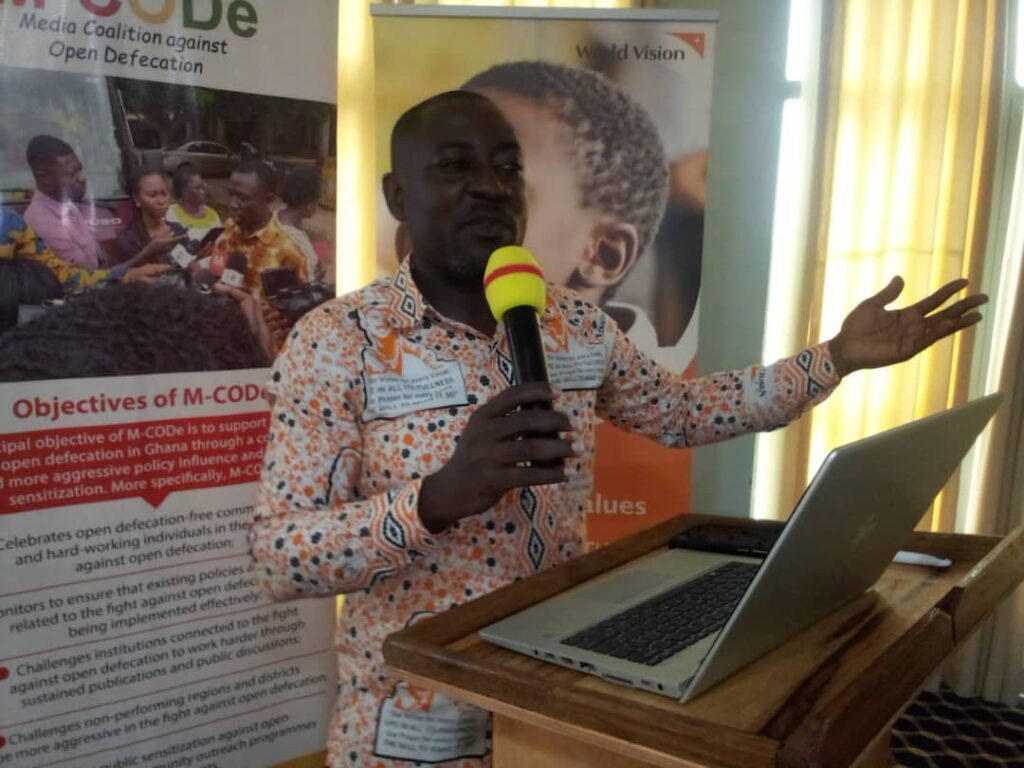
Mr. Attah Arhin a Technical Specialist on Water and Sanitation Hygiene (WASH) with World Vision Ghana has lamented terribly that 26% of public schools in Ghana operate without toilet facilities. Apexnewsgh.com report The WASH Technical Specialist made the revelation on Tuesday, July 19, 2022, during the launch of the Upper East Regional Branch of the Media Coalition against Open Defecation (M-CODe) “When it comes to WASH schools, the situation is also very terrible for 26% of public schools not having access to a toilet facility is unacceptable and it let itself to so many difficulties for the children, for their Education, for their health and all the other related issues. He believes, the government needs to work with all stakeholders to urgently address this situation otherwise, it can be a major risk for the innocent children in schools. “It is not fashionable in the 21st century, it is no more fun to be defecating in the open”. However, giving some explanations about M-CODe, he said it was first introduced in 2018 to help develop the capacity of the media as advocates for improved sanitation, especially with the agenda to eliminate Open Defecation (OD) across the country. Apexnewsgh.com/Ghana/ Ngamegbulam Chidozie Stephen/M-CODe/Upper East Region
UER: 92% of the population of Upper East citizens have no access to a toilet facility
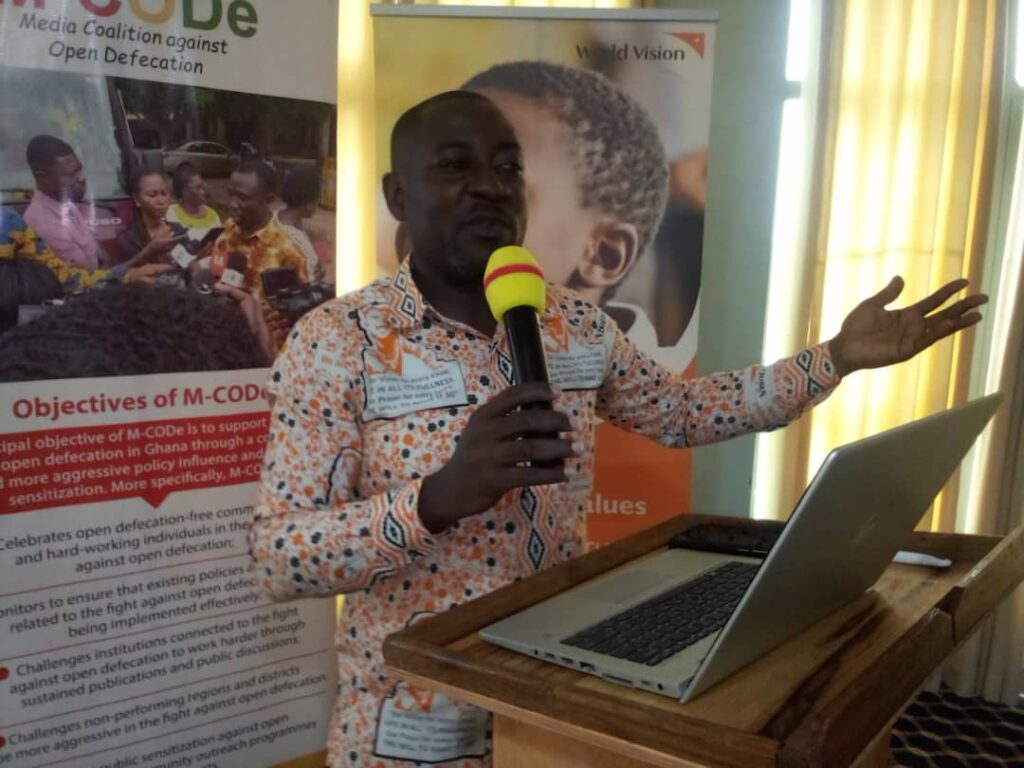
Mr. Attah Arhin a Technical Specialist on Water and Sanitation Hygiene (WASH) with World Vision Ghana has revealed that only 8% of the population of the Upper East have access to a toilet facility. According to Mr. Arhin, “The multiple indicator cluster survey 2018 shows that only 8% of the population of Upper East Region have access to a toilet facility. So, 92% of the population of the people of the Upper East Region don’t use toilet facilities at their homes or work side. The WASH Technical Specialist revealed this on Tuesday, July 19, 2022, during the launch of the Upper East Regional Branch of the Media Coalition against Open Defecation (M-CODe). He said: That is the kind of difficulty we are confronted with. Meanwhile, expanding more on the situation, Mr. said: “If you have a region that has over 60% of its population or citizens defecating in the open, it must be a matter of great concern. And Upper East obviously is bleeding in terms of the multiple indicator cluster surveys in terms of the joint monitoring platform. But I have just checked with the population and housing census 2021, and have realized Savannah has now overtaken Upper East. Savannah Region is 68.5%, Upper East is 68.4% in terms of Population and housing census. So, that is a major issue and I think something drastic needs to happen to get the region out of this situation. It is not fashionable in the 21st century, “It is no more fun to be defecating in the open. It is abominable, in fact, it is criminal and people must have that shame that where they are defecating is not good. So, for you to move out of your house and defecating is a serious thing and I think that not only to citizens, and also to the authorities and to the officials of MMDAs and the region will now be free from the tag”. He said He added, “The diseases bring shame, people do not find it comfortable visiting the region for tourist activities and all that. But when we get rid of this, we save the lives of our children and they will be free from diseases and free from death, that’s what we are calling for. Meanwhile, as part of his speech, Mr. Arhin admonished the newly launched Upper East Regional Branch of the Media Coalition against Open Defecation (M-CODe) to work so hard in making sure issues of Open Defecation (OD) is a thing of the past. However, giving some explanations about M-CODe, he said it was first introduced in 2018 to help develop the capacity of the media as advocates for improved sanitation, especially with the agenda to eliminate Open Defecation (OD) across the country. Apexnewsgh.com/Ghana/ Ngamegbulam Chidozie Stephen/M-CODe/Upper East Region


